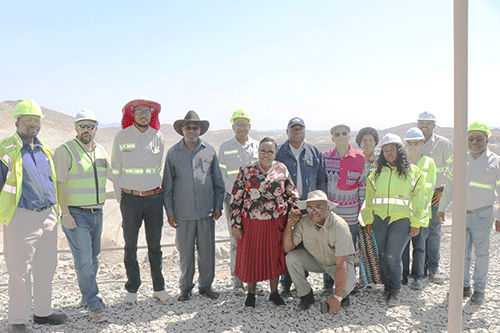George Sanzila
KARIBIB – The Navachab Gold Mine, located 10 kilometres west of Karibib, spent more than N$2 billion on procurement in 2022, with more than half that amount spent on local companies.
This information was revealed to the Parliamentary Standing Committee on Natural Resources during its visit to mining companies in the Erongo region.
The committee is in the region to find out whether mining companies are complying with environmental and labour laws, and that corporate social responsibility duties are respected, as well as to establish government shareholding in mining companies and the status of beneficiation.
The mine’s managing director (MD) George Botshiwe further revealed that the blast hole drilling function is currently outsourced fully to local contractors.
According to Botshiwe, the company believes in empowering citizens either through the outsourcing of jobs to local companies with expertise, provision of employment or internships for mining graduates.
“We have given so many jobs to locals and small contractors, and we have been very happy with the outcome. Kodo was awarded a 4-year blast hole drilling contract at N$125 million, NU Trading at N$43 million, Landsberg N$15 million, Stewardship Drilling at N$30 million and Oshikoto Transport N$13 million. The only time we do procurement outside the country is when we procure explosives, major equipment and spare parts,” he explained.
Botshiwe further noted that the mine, which employs over 1 000 permanent and temporary workers, has created over 600 jobs in the last three years.
The mine offers internships to graduates as part of its efforts to impart the necessary skills to enable them to be absorbed in permanent employment.
According to the MD, the company has made a deliberate decision to accommodate mining engineer students in internships to lessen the burden of unemployment.
“We have so many unemployed mining engineers who graduate from our institutions of higher learning. We have taken a deliberate decision to get these graduates off the street and train them through internships, instead of continuously sending them to school and only ending up adding to the number of the unemployed,” noted Botshiwe.
He noted that as part of its social corporate responsibility, Navachab Gold Mine has drilled over 12 boreholes in the regions of Kavango West, Zambezi, Kunene and Omaheke at a combined cost, exceeding N$5 million, benefitting over 700 households and over 15 000 livestock.
The company has further taken the initiative to construct a medical centre in Karibib, which is envisaged to help the local community to have easy access to medical care.
The centre will be constructed in phases for five years at a cost of over N$180 million.
Members of Parliament commended the company for taking the lead in considering local companies.
However, lawmaker Maria Kamutali decried the tendency of big companies to contract foreign-owned companies for work that can be performed by local contractors.
“We have heard how your company is giving work to local contractors and how well they have been performing. I want to commend you for that, but we still have so many companies – not only in the mining sector – sub-contracting work to foreign companies at the expense of locals. Until when are we going to rely on foreign companies to perform work that we, ourselves, can do?” asked Kamutali rhetorically.
Botshiwe mentioned high water and energy costs as the two biggest challenges affecting profit, adding that innovation was at the centre of its operations, and that plans were afoot to construct their own solar plant to help reduce the cost of production.
“We are a low-grade mine, and one has to be very innovative in order to reduce the costs. We are the first mine in the world to use the XRT technology in gold processing in order to reduce our costs. Water is a challenge, and electricity from Nampower is quite exorbitant,” he noted.
Navachab mines gold and silver as a byproduct. The mine is owned by QKR, which has a 92.5% shareholding, with the remaining 7.5% owned by the government of Namibia through Epangelo Mining Company.
The committee also visited Erongo Marble, as well as Granite and African Granite.
Other members of Parliament on the oversight visit included Tjekero Tweya, who chairs the Natural Resources Standing Committee, Kletus Karondo – the chairperson of the subcommittee on mines and energy within the natural resources committee, Kennedy Shakupakela, Diederik Vries and Maria Elago.
*George Sanzila works for the National Assembly in the Division: Research, Information, Publications and Editorial Services.


